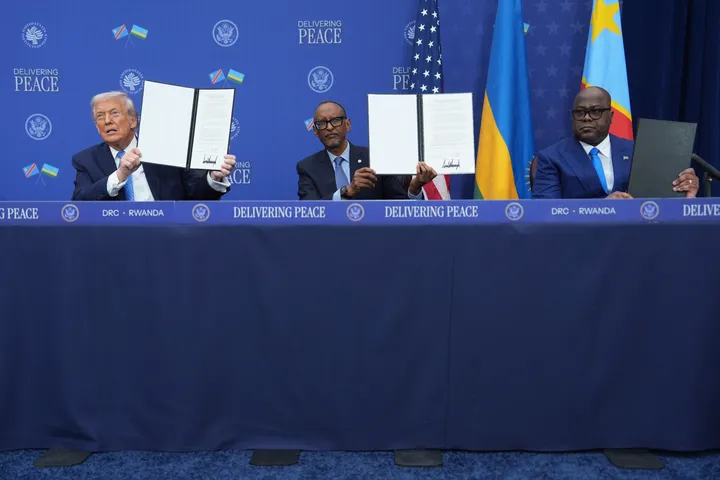Sudan's embattled capital awoke Monday to a third day of heavy fighting between the army and a powerful rival force for control of the country, as the weekend's civilian death toll rose to 97.
A sustained firing was heard near the military headquarters, with white smoke rising from the area. Residents hunkering down in their homes reported power outages and incidents of looting.
“Gunfire and shelling are everywhere,” Wadeya Mahmoud Koko, head of a union for thousands of tea vendors and other food workers, said from her home in Khartoum.
She said a shell stuck a neighbor's house Sunday, killing at least three people. “We couldn’t take them to a hospital or bury them.”
The clashes are part of a power struggle between Gen. Abdel-Fattah Burhan, the commander of the armed forces, and Gen. Mohammed Hamdan Dagalo, the head of the Rapid Support Forces, a paramilitary group.
The two generals are former allies who jointly orchestrated an October 2021 military coup that derailed Sudan’s short-lived transition to democracy.
Both men have dug in, saying they would not negotiate a truce, instead engaging in verbal attacks and demanding the other's surrender. Still, both have powerful foreign backers, making them potentially susceptible to mounting diplomatic pressure.
Since fighting erupted on Saturday, 97 civilians have been killed and hundreds have been wounded, said the Sudan Doctors' Union, a pro-democracy group monitoring casualties. There has been no official word on the number of fighters killed.
The doctors' group said a stray shell struck a hospital south of Khartoum on Monday morning, without causing causalities.
Life becoming unbearable
A journalist based in Khartoum Shakoor Nyaketo told TRT Afrika on Monday morning ''the situation is getting worse now'' because the ''shooting is continuing heavily.''
Shakoor said access to food, medicine and electricity is ''very difficult'' for residents and there reports of people in some neighbourhoods looting shops to get food and other essential commodities.
''There are places where there is no electricity since the fight started while some places get power for only a few hours only for a few hours, he added.
Shops, pharmacies and clinics remain closed. The local journalist said people are worried that if the clashes between the army and the paramilitaries take much longer, life could become unbearable for many civilians.
''People want this fighting to stop immediately, they want to get back to their normal lives,'' he said.
The chaotic scenes of fighting with tanks, truck-mounted machine guns, artillery and warplanes in densely populated areas of the capital are unprecedented.
Sudan has a long history of civil strife, but much of that has taken place in remote tribal areas, far from Khartoum.
The violence erupted during the Muslim fasting month of Ramadan which ends later this week. The usual Eid al-Fitr celebrations which mark the end of Ramadan are likely to be hugely shattered by the conflict this year in Sudan.
On Sunday, the warring sides agreed to a three-hour pause in fighting to allow civilians to stock up on necessities. Compliance was spotty, and there were reports of casualties during the humanitarian pause.
Koko, the head of the tea vendors' union, called on Burhan and Dagalo to stop fighting and withdraw troops from residential areas. “We, the people, want to live in peace,” she said. "We want security.”
Top diplomats urged the sides to stop fighting, including the U.S. secretary of state, the U.N. secretary-general, the EU foreign policy chief, the head of the Arab League and the head of the African Union Commission.
The U.N. Security Council is expected to discuss the developments in Sudan later on Monday.
























